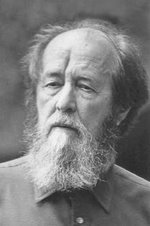If Solzhenitsyn is a prophet, how does he compare with the Biblical prophets? I remember in the late 70s when I was discovering Solzhenitsyn, I was also discovering Isaiah in the Bible. Isaiah brought home to me the dynamic of a truly theistic world view, that God is the Real Thing and nothing else can compare or compete with Him. For example, from chapter 40:
12 "Who has measured the waters in the hollow of his hand
and marked off the heavens with a span,
enclosed the dust of the earth in a measure
and weighed the mountains in scales
and the hills in a balance?"
13 "Who has measured the Spirit of the LORD,
or what man shows him his counsel?"
14 "Whom did he consult,
and who made him understand?
Who taught him the path of justice,
and taught him knowledge,
and showed him the way of understanding? "
15 "Behold, the nations are like a drop from a bucket,
and are accounted as the dust on the scales;
behold, he takes up the coastlands like fine dust. "
And then I realized that Solzhenitsyn's patronymic was Isayevich, which made it sound like his father was named Isaiah. (Actually his father's name was Isaak, the family chose to drop the 'k' was dropped from his patronymic, but I only realized that much later). For a while I had a fanciful notion that Aleksandr son of Isaiah had a similar writing style to Isaiah the prophet, but I think now this is dubious. Both have the theme of the foolishness of human vanity, the foolishness of thinking a kingdom or a political system is really eternal, but I suppose that is where the resemblance ends.
Another prophet that I recently thought of identifying with Solzhenitsyn is Habakkuk. Not nearly as well known as Isaiah, Jeremiah or Daniel, but a very interesting book. And it is only three chapters. The chapter begins with Habakkuk asking God what is happening, that the nation of Israel, God's chosen nation, is not doing well.
1:4; "So the law is paralyzed,
and justice never goes forth.
For the wicked surround the righteous;
so justice goes forth perverted."
Why isn't God doing something about it?
God's response is, He will. He will bring the Babylonian empire and conquer Israel, to punish them. And Habakkuk is completely confused -- Israel is in a corrupt state, but Babylon is much worse!
1:13 "You who are of purer eyes than to see evil
and cannot look at wrong,
why do you idly look at traitors
and are silent when the wicked swallows up
the man more righteous than he? "
God says to Habakkuk that He will in turn punish Babylon as well. And most of chapter 3 is a vision of God's great power, then followed by Habakkuk's surprising declaration, that he now believes and will not despair whatever goes wrong in the future:
3:17 "Though the fig tree should not blossom,
nor fruit be on the vines,
the produce of the olive fail
and the fields yield no food,
the flock be cut off from the fold
and there be no herd in the stalls,"
18 "yet I will rejoice in the LORD;
I will take joy in the God of my salvation."
19 "GOD, the Lord, is my strength;
he makes my feet like the deer's;
he makes me tread on my high places."
I see Habakkuk's spiritual journey as like Solzhenitsyn's, both saw an evil political system totally dominant for a while, but came to a strong faith in God as good, and as all powerful.
Subscribe to:
Post Comments (Atom)

No comments:
Post a Comment